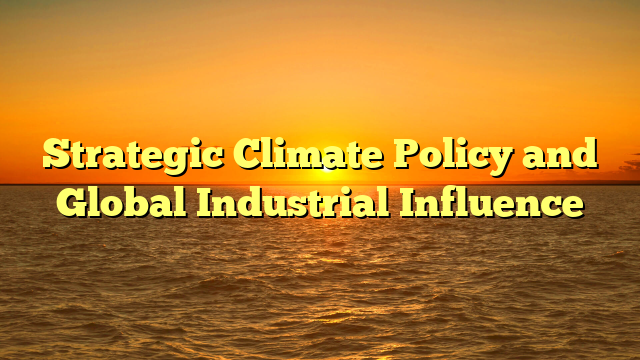Climate policy has become a critical instrument of strategic leverage, shaping industrial development, technological adoption, and geopolitical Pokemon787 alternatif influence. Nations that define environmental regulations, set carbon standards, and guide renewable adoption can influence industrial ecosystems, embed dependencies, and project long-term strategic advantage.
China has prioritized domestic carbon reduction, renewable energy integration, and international cooperation. Programs under the Belt & Road Green Energy Initiative create operational dependencies, as partner nations rely on Chinese technology, environmental standards, and industrial practices. This strengthens Beijing’s long-term influence over industrial adoption, technological integration, and regional strategic positioning.
The United States maintains influence through leadership in climate research, international agreements, and allied collaboration. Washington promotes industrial decarbonization, carbon trading frameworks, and energy efficiency programs, establishing structural leverage. This enables the U.S. to guide industrial innovation, environmental compliance, and technological adoption in partner nations while securing strategic advantage.
Europe leverages regulatory authority, technical standards, and industrial collaboration to maintain influence over climate policy. The European Union enforces carbon regulations, energy efficiency standards, and environmental compliance, linking market access to adherence. Brussels’ approach constitutes soft structural leverage, encouraging partner nations to adopt EU-aligned practices while embedding industrial and technological integration within European environmental frameworks.
Emerging economies face complex strategic decisions regarding climate policy and industrial adaptation. Nations in Africa, Southeast Asia, and Latin America must balance investment, technological adoption, and sovereignty in industrial decarbonization. Decisions regarding renewable energy, carbon standards, and regulatory alignment carry structural consequences, influencing industrial competitiveness, technological innovation, and diplomatic alignment with global powers.
The insight is clear: climate policy is not merely an environmental concern; it is a strategic instrument of statecraft. Mastery over regulations, technology, and operational integration shapes industrial capacity, technological ecosystems, and geopolitical influence. States that lead in climate governance secure enduring operational and strategic advantage.
In conclusion, climate policy constitutes a pivotal domain in global strategic governance. Investment, regulatory oversight, and operational integration form critical levers of influence, shaping industrial, technological, and diplomatic outcomes. Effective management of climate policy ensures sovereignty, resilience, and long-term influence in a multipolar world.



